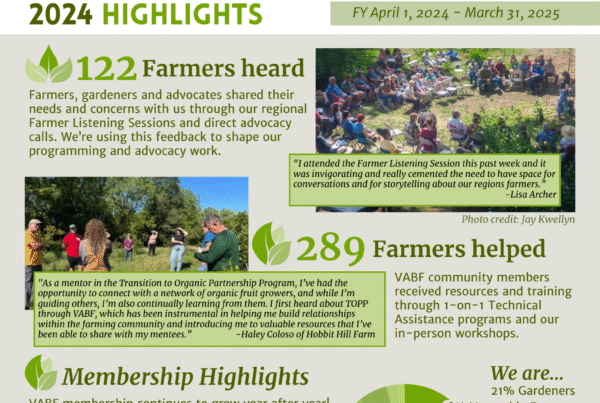National Sustainable Agriculture Coalition Meets in DC to Identify and Initiate Next Steps
What happens at National Sustainable Agriculture Coalition (NSAC) after a hard-wrought Farm Bill passes, and despite its shortcomings, includes major wins beyond what one could hope for in the current political climate? Rest and be thankful?
When NSAC hosted representatives from over half of its 100+ member organizations at the NSAC winter meeting in Washington, DC this January 27-30, we shared much gratitude and even celebration. But our work was just beginning.
Implementation and administration – how the USDA translates legislative language for the Local Agriculture Markets Program (LAMP), the Farming Opportunities Training and Outreach (FOTO), and the improved conservation programs through rule making, requests for proposals, and program delivery – require as much attention, analysis, and advocacy as development of the Farm Bill itself. In addition to engaging with USDA to help ensure these programs serve family farms, food systems, and environmental health as intended, we must continue to work with key Members of Congress in their oversight role in USDA implementation, and to ensure adequate funding for “discretionary” programs such as Sustainable Agriculture Research and Education (SARE).
After two days working together to prioritize and strategize the coming year’s work, many of us spent Wednesday Jan 30 on Capitol Hill meeting with agricultural staff of our Senators and Representatives. With a new Congress, including many freshman Representatives and Senators, this is a time to begin developing new relationships and to inform staff of the needs of farmers and rural communities, and critical issues such as soil health, water quality, and climate change.
For a more complete account of our time together, our Lobby Day on Capitol Hill, and upcoming work, see http://sustainableagriculture.net/blog/2019-winter-meeting/.
Update on Virginia’s Congressional Delegation
The 2018 election brought a new Representative, Abigail Spanberger (D) into Virginia’s delegation on Capitol Hill, and she has been appointed Chair of the Conservation and Forestry subcommittee within the House Agriculture Committee. Unfortunately, I only learned this when I arrived at the NSAC meeting, and did not have time to set up an in person meeting with her DC staff. However, VABF policy volunteer Patricia Stansbury is arranging an in-district meeting in the Richmond area during the February Congressional recess.
During the NSAC lobby day, Steve Warshawer, Julie Lasseter, and Lucy Jodlowska of Winrock International and NSAC policy specialist Nichelle Harriott joined me in visiting the offices of Virginia Senators Tim Kaine and Mark Warner. We found much common ground with their agricultural staff, Donald Pollard (Kaine) and Yemisi Egbewole (Warner) on issues ranging from local and regional food systems and racial justice in US food and agriculture, to conservation and organic research. It was especially inspiring to hear Ms. Egbewole describe Senator Warner’s strong commitment to racial justice and equity throughout the agricultural and food system, and plans to convene roundtable events for farmers and communities of color.
In addition, Mr. Pollard indicated that Senator Kaine shares our concerns regarding USDA’s hasty move to kick the National Institute for Food and Agriculture (NIFA) and Economic Research Servicer (ERS) out of the DC area. Many others on Capitol Hill are watching this situation; for example, the 2019 Appropriations bill includes language urging USDA to hit the “pause” button until a full cost/benefit analysis is completed.
The Green New Deal and the Special Panel on Climate Change
You may have heard about the Green New Deal, a resolution introduced in Congress on February 7 by Representative Alexandria Ocasio-Cortez and Senator Ed Markey. National Public Radio posted a writeup of this development, including the full text of the resolution, HERE .
This makes inspiring reading, as it seeks to address the climate crisis, poverty, and racial / economic inequities in a bottom-up approach that is not only fair to all but actively engages all. Yet, it touches only briefly on the roles of agriculture in climate change, its mitigation, and adaptation to its effects.
The very same day, House Speaker Nancy Pelosi re-established the Special Panel on the Climate Crisis, naming Rep, Kathy Castor (D-FL) as chair, and appointing eight other Representatives including Virginia’s Donald McEachin.
These developments open an opportunity to educate climate action proponents on Capitol Hill on the substantial potential of sustainable and organic farming and ranching systems to help sequester carbon, reduce net greenhouse gas emissions, and enhance the resilience of agricultural ecosystems and the food system as a whole to the impacts of weather extremes and climate shifts. The VABF policy team plans to begin this dialog with Reps McEachin and Spanberger in the near future.
For more research-based information on climate and agriculture, see the new Soil Health and Organic Farming Guide, covering practices for climate mitigation, adaptation and carbon sequestration, available at https://ofrf.org.
By Mark Schonbeck






